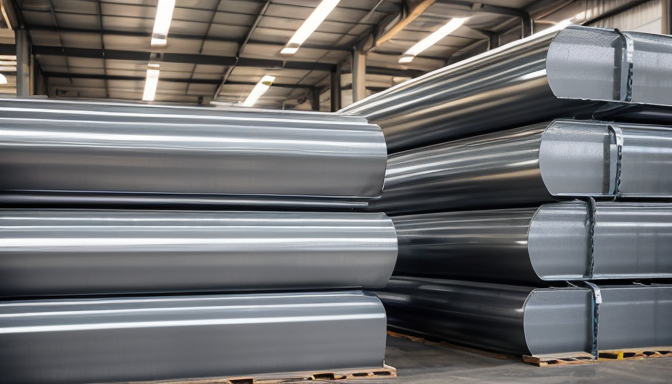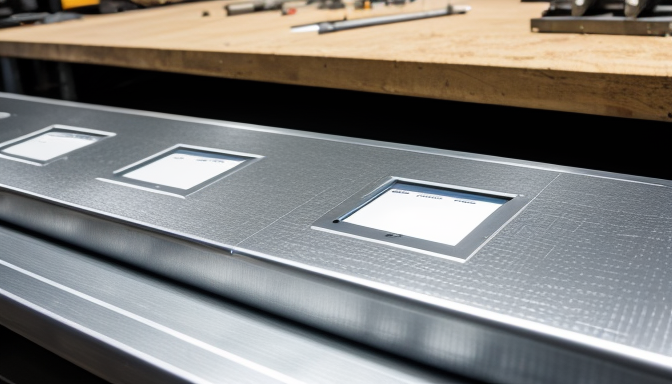When it comes to choosing materials for construction or manufacturing, P355NH steel sheets stand out as a popular choice. But what exactly makes them so appealing? Let’s dive into the essentials of P355NH steel sheets, including their pricing, weight, properties, sizes, and applications. By the end of this article, you’ll have a solid understanding of why this material could be the right fit for your next project.
P355NH steel sheets are not just any ordinary steel; they are designed to withstand high temperatures and pressures, making them suitable for various industrial applications. Picture this: you’re working on a project that requires durability and strength. You wouldn’t want to compromise, right? That’s where P355NH comes into play. Its unique properties ensure that it can handle demanding environments, whether in pressure vessels, boilers, or structural applications.
Now, let’s talk about the pricing. Understanding the cost of P355NH steel sheets is crucial for budgeting your projects. Prices can vary based on several factors, including:
- The thickness of the sheets
- Market demand and supply
- Supplier location
- Order quantity
Generally, you can expect a price range that reflects these variables. Keeping your budget in check while ensuring you get quality materials is key.
Next up is the weight of these sheets. Weight is an important aspect, especially when you consider transportation and handling. The weight of P355NH steel sheets depends on their thickness and dimensions. For instance, a thicker sheet will naturally weigh more than a thinner one. This can affect your logistics, so it’s worth noting the specifications ahead of time. Here’s a quick look at how weight might vary:
| Thickness (mm) | Weight (kg/m²) |
|---|---|
| 5 | 39.37 |
| 10 | 78.74 |
| 20 | 157.48 |
Moving on to the properties of P355NH steel sheets, these materials are known for their excellent mechanical and chemical characteristics. They offer high tensile strength and good weldability, making them easy to work with. This means you can fabricate them into various shapes and sizes without worrying about compromising their integrity. Imagine the peace of mind you’ll have knowing your materials can handle the heat—literally!
Finally, let’s discuss the sizes available. P355NH steel sheets come in a variety of dimensions to suit different project needs. Whether you require standard sizes or custom options, there’s likely a solution that fits your specifications. This flexibility can save time and effort in sourcing materials, allowing you to focus on what truly matters: getting your project done.
In conclusion, P355NH steel sheets are a versatile choice for many industries. From understanding pricing and weight to exploring their properties and sizes, you’re now equipped with the knowledge to make informed decisions. So, when planning your next project, consider the benefits of P355NH steel sheets. They might just be the perfect fit!
P355NH Steel Sheet Price
Understanding the pricing structure of P355NH steel sheets is crucial for budgeting in construction and manufacturing projects. The price of these sheets can vary significantly based on several factors. First, let’s consider the thickness of the steel sheet. Thicker sheets generally cost more due to the increased amount of material used. Additionally, the size and dimensions of the sheets play a vital role. Standard sizes may be cheaper compared to custom dimensions, which often come with a premium.
Another important factor is the market demand. Prices can fluctuate based on how much steel is required in various industries. For instance, during a construction boom, prices may rise due to increased demand. Conversely, during slower economic times, prices might drop. It’s also worth noting that suppliers may offer different pricing based on their location and the cost of transportation. If you’re sourcing from a distant supplier, shipping costs can add up.
To give you a clearer picture, here’s a general price range for P355NH steel sheets:
| Thickness (mm) | Price Range (per ton) |
|---|---|
| 6 | $600 – $700 |
| 10 | $800 – $900 |
| 12 | $950 – $1050 |
| 20 | $1200 – $1300 |
These prices are just estimates and can vary based on the factors mentioned earlier. It’s always a good idea to get quotes from multiple suppliers to ensure you’re getting a fair deal. Additionally, consider any potential discounts for bulk purchases. If you’re ordering large quantities, suppliers might be willing to negotiate a better price.
In summary, while the price of P355NH steel sheets can vary, understanding the influencing factors can help you make informed decisions. Keep an eye on market trends and always compare prices to get the best value for your project.

P355NH Steel Sheet Weight
The weight of P355NH steel sheets is a crucial factor to consider when planning for transportation and handling. Why is this important? Well, heavier sheets can lead to increased shipping costs and require more robust handling equipment. Understanding the weight can help you budget effectively and ensure that your project runs smoothly.
Generally, the weight of a steel sheet is determined by its dimensions and thickness. For instance, a thicker sheet will naturally weigh more than a thinner one. Here’s a simple breakdown:
| Thickness (mm) | Weight (kg/m²) |
|---|---|
| 4 | 31.5 |
| 5 | 39.4 |
| 6 | 47.3 |
| 8 | 63.1 |
| 10 | 78.8 |
As you can see from the table, the weight increases with thickness. This information is essential for various industries, including construction and manufacturing. For example, if you’re working on a large-scale project, knowing the weight helps in selecting the right lifting equipment. It also assists in planning the logistics of moving these sheets to your worksite.
When considering the weight of P355NH steel sheets, it’s also wise to account for the total area you need. For instance, if you require a sheet that is 2 meters by 1 meter and 8 mm thick, you’d multiply the area (2m x 1m 2m²) by the weight per square meter from our table. This calculation will give you the total weight, which is vital for transportation planning.
In short, understanding the weight of P355NH steel sheets is not just a number; it’s about making informed decisions. It affects your budget, your choice of equipment, and the efficiency of your project. So, next time you’re planning a project, take a moment to consider how the weight of your materials will play a role in your success.
P355NH Steel Sheet Properties
P355NH steel sheets are not just any regular sheets; they are crafted for strength and resilience. These sheets are often used in environments where the stakes are high. Imagine building a bridge or constructing a pressure vessel. You need materials that can withstand extreme conditions. P355NH steel is your go-to choice.
One of the standout features of P355NH steel is its excellent mechanical properties. It has a high yield strength, which means it can bear heavy loads without deforming. This is crucial in applications like construction, where safety is paramount. Typically, P355NH steel boasts a yield strength of about 355 MPa. This strength ensures that the material can handle the pressures it faces in various industrial settings.
But strength isn’t everything. The chemical composition of P355NH steel also plays a vital role in its performance. This steel is primarily made up of iron with additional elements that enhance its properties. These include:
- Carbon: Improves hardness and strength.
- Manganese: Enhances hardenability and toughness.
- Silicon: Increases strength and resistance to oxidation.
This combination of elements makes P355NH steel sheets resistant to high temperatures and corrosion. They can perform well even in harsh environments, making them ideal for industries like oil and gas, power generation, and shipbuilding.
Another important aspect is their durability. P355NH steel sheets are designed to last. They resist wear and tear, which means less frequent replacements. This is not just a cost-saving feature; it also reduces downtime in industrial applications. You can think of it as investing in a reliable workhorse that keeps going.
Furthermore, P355NH steel sheets are versatile. They can be easily welded and shaped, which opens up a world of possibilities for manufacturers. Whether you need large sheets or custom sizes, P355NH can be tailored to fit your project. This adaptability is a significant advantage when you are working on unique designs or specifications.
In summary, the properties of P355NH steel sheets make them a preferred choice in various applications. Their strength, durability, and resistance to harsh conditions ensure they perform reliably. When you’re considering materials for your next project, think of P355NH steel sheets as a solid foundation. They are more than just sheets; they are a promise of quality and performance.

P355NH Steel Sheet Sizes
When it comes to P355NH steel sheets, size matters. The right dimensions can make or break a project. You might wonder, how do you choose the right size? Well, it’s not just about picking a number. It’s about understanding your needs.
P355NH steel sheets come in various standard sizes, catering to a wide range of applications. These sheets are typically available in thicknesses ranging from 5 mm to 100 mm. But that’s not all! They can also be customized to meet specific project requirements. The flexibility in size is one reason why P355NH sheets are so popular in industries like construction, shipbuilding, and pressure vessels.
Here’s a quick overview of standard sizes:
| Thickness (mm) | Width (mm) | Length (mm) |
|---|---|---|
| 5 | 1000 | 2000 |
| 10 | 1250 | 2500 |
| 20 | 1500 | 3000 |
| 50 | 2000 | 6000 |
Choosing the right size isn’t just about fitting into a spot. It’s about ensuring the integrity of your project. For example, if you’re working on a pressure vessel, the thickness and size must comply with safety regulations. Otherwise, you could face serious consequences.
Moreover, when planning your purchase, consider the weight of the steel sheets in relation to their size. Heavier sheets might require more robust handling and transportation solutions. So, always keep your project’s logistics in mind.
In summary, understanding the sizes of P355NH steel sheets can greatly impact your project’s success. Don’t just pick a size because it looks good on paper. Think about the application, the environment, and the specific requirements of your project. When in doubt, consult with a supplier or an expert in the field to ensure you’re making the best choice.
Frequently Asked Questions
- What is P355NH steel sheet?
P355NH steel sheet is a high-strength, low-alloy steel known for its excellent mechanical properties and resistance to high temperatures. It is widely used in the construction and manufacturing industries, particularly for pressure vessels and boilers.
- How much does P355NH steel sheet cost?
The price of P355NH steel sheets can vary based on factors like thickness, size, and market demand. Generally, you can expect a price range between $X to $Y per ton, but it’s always best to check with suppliers for the most accurate quotes.
- What are the weight specifications for P355NH steel sheets?
The weight of P355NH steel sheets depends on their dimensions and thickness. For example, a sheet measuring 1 meter by 2 meters with a thickness of 10 mm weighs approximately X kg. Knowing the weight is crucial for planning transportation and handling.
- What are the key properties of P355NH steel sheets?
P355NH steel sheets boast impressive mechanical properties, including high tensile strength, good weldability, and excellent toughness at elevated temperatures. These characteristics make them ideal for demanding applications in various industries.
- What sizes are available for P355NH steel sheets?
P355NH steel sheets are available in a range of standard sizes, typically including thicknesses from 6 mm to 100 mm and widths up to 3 meters. Custom sizes can also be ordered to meet specific project requirements.
- In which industries is P355NH steel sheet commonly used?
This versatile steel sheet is commonly found in industries such as oil and gas, power generation, and chemical processing. Its ability to withstand high pressures and temperatures makes it a go-to choice for pressure vessels and heavy machinery.
